Saturday, October 02, 2010
Our Blessed Lady's Saturday

October's Queen
by Dennis A. McCarthy
When the grass was springing,
When the fields were gay,
When the winds were singing
All the happy day,
Then we gathered 'round thee,
Mother dear, and crown'd thee
With the brightest blossoms
Of the meads of May.
Now that the winds are grieving
Over the summer dead,
All the woodlands reaving
Of their riches red,
Once again we're kneeling,
To thy heart appealing,
Twining other garlands
For thy holy head.
Rosy crowns we wrought thee
In thy month of flow'rs,
Rosy crowns we brought thee
From the Maytime bow'rs.
But when roses fail us,
Rosaries avail us;
'Tis with these we crown thee
In October hours.
Denis A. McCarthy
Robert, Cyril, Our Lady's Praise in Poetry,
Poughkeepsie, New York: Marist Press, 1944.
Labels: Our Blessed Lady
Our Angel Guardians
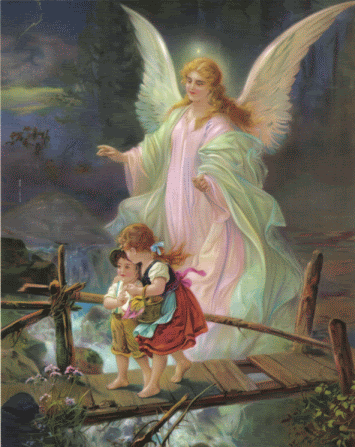
OK, no mention of the Guardian Angels would be complete without Hansel and Gretel, the image in a million homes and instantly familiar to almost all Christians. Now we move past this chestnut to other, better traditional images of our Guardian Angels at work.
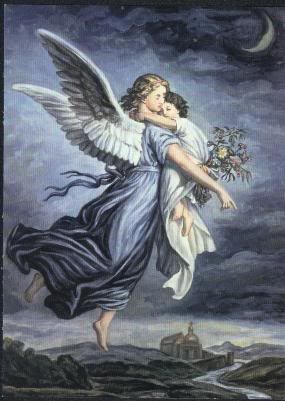
I have often thought, though it is utterly inadequate, and probably impossible, that I would love to sit down with my Guardian Angel, and chat about things over a cigar and a glass or two of Drambuie, and a darned fine steak. A meaningless impulse, since Angels probably do not consume things like that. But, one born of gratitude and love, nevertheless.
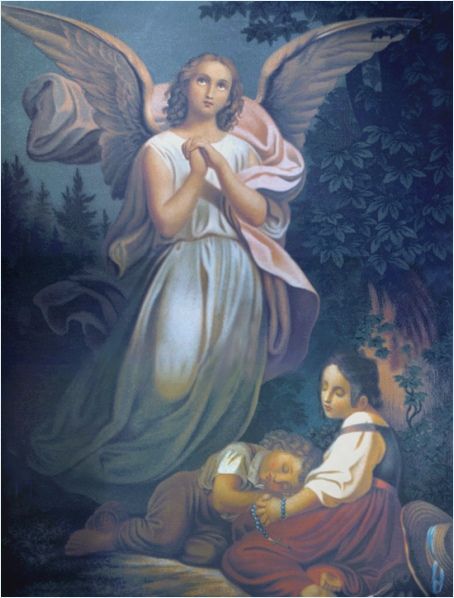
One notion about Angels that I am pretty sure we need to dispel is that Angels are the souls of people who have died, gone to Heaven, and "earned their wings." Frank Capra, God love him, really planted that one firmly in the American psyche in It's A Wonderful Life. But it is wrong. Angels are a separate order of creation. People do not become Angels. They can become Saints. Not Angels. Angels never were people living on earth. Saints were. Therefore, we ask for the intercession of "All the Angels and Saints." We are praying for the prayerful assistance of two different and non-overlapping groups.
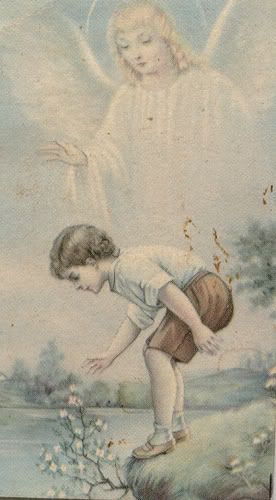
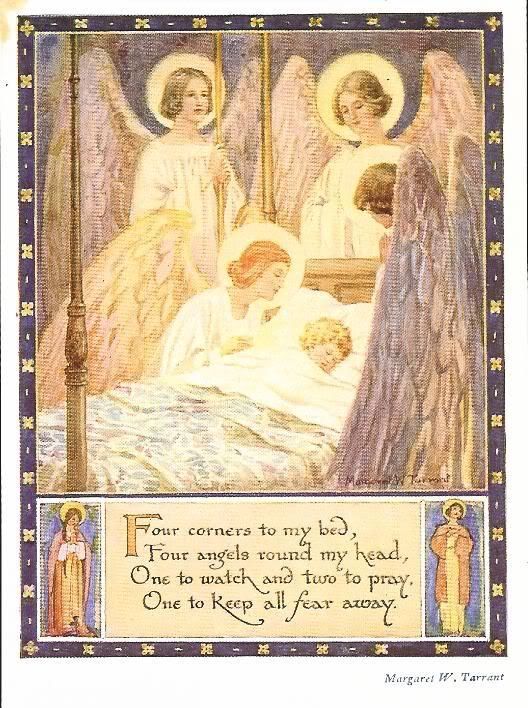
People who thrive off popular culture over the last 20 years or so have gone absolutely ga-ga over Angels. Most of what we see about them is sickly-sweet and sentimental in the extreme. And even in these very traditional Catholic images of Guardian Angels, the people they are guarding are always depicted as children. Why are there no good traditional depictions of Guardian Angels watching over adults? My own upbringing did not emphasize the presence of our Guardian Angels. But I have felt the presence of mine strongly as an adult, and never more than in the last 5 years.
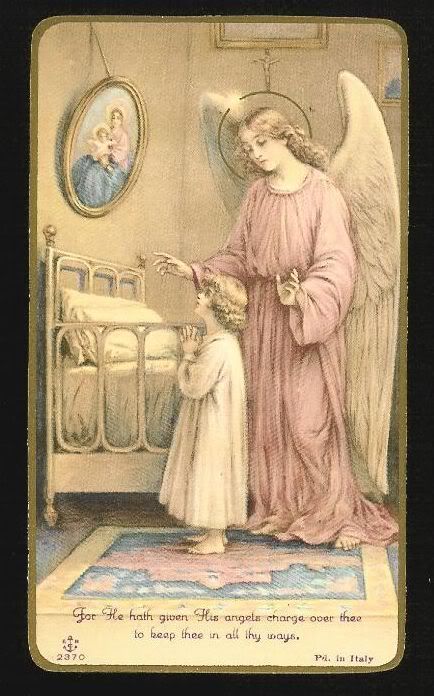
The powers of our Guardian Angels are impossible for us to fathom. They work in numerous ways. I know I have benefited from my Guardian Angel's power to delay me with something that annoys me, but delays me just enough to keep me from some catastrophe, like a wild car wreak.
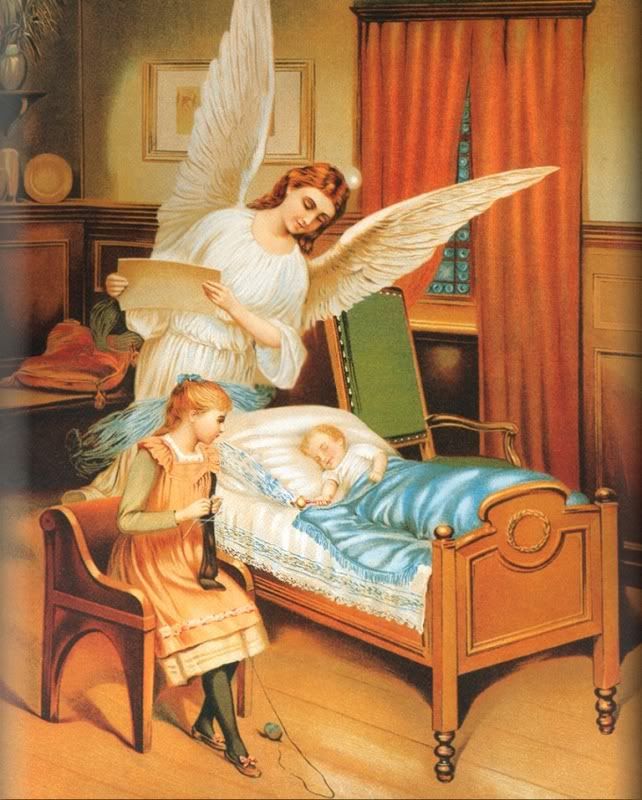
The number of ways in which my own Guardian Angel watches out for me is incomprehensible. He must be working non-stop, and working not just in my vicinity and on what I am concentrating on at the moment, but in numerous vicinities and numerous spheres of my existence simultaneously. The power of the Guardian Angel to protect me in so many ways all the time is, while awesome to me, just a pale shadow of the power of God.
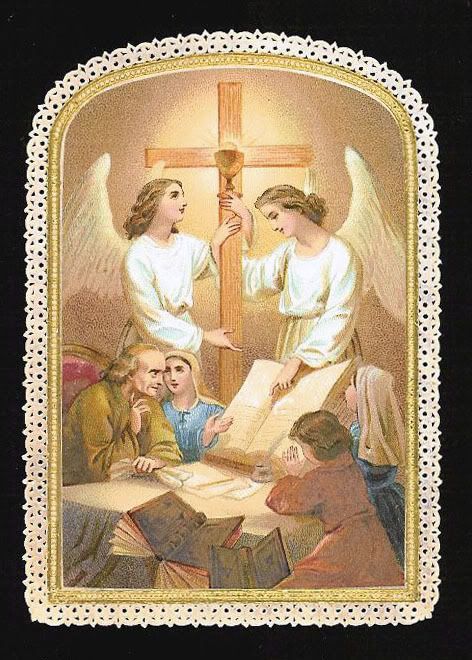
In a family, the various Guardian Angels of the household must cooperate with each other in interesting ways. They must be very sad when families break up.
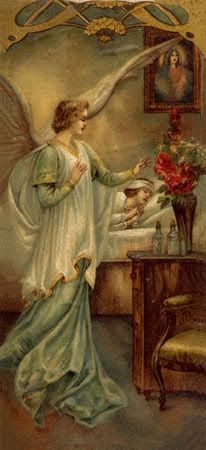
We, each of us, owe our Guardian Angel thanks in so many ways, we can never adequately express it. Our Guardian Angel has done more for us than even our earthly parents. And, unlike our earthly parents, our Guardian Angel is always there until the moment we die, and probably still protecting us in Purgatory. Thank you, Guardian Angel. I love you.
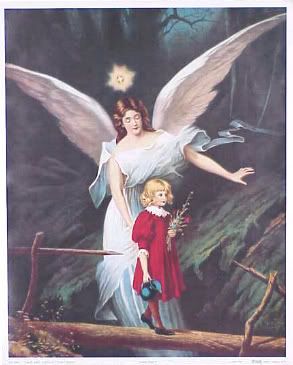
Angel of God, my Guardian dear,
To whom God's love commits me here,
Ever this day be at my side,
To light and to guard, to rule and to guide.
Amen.
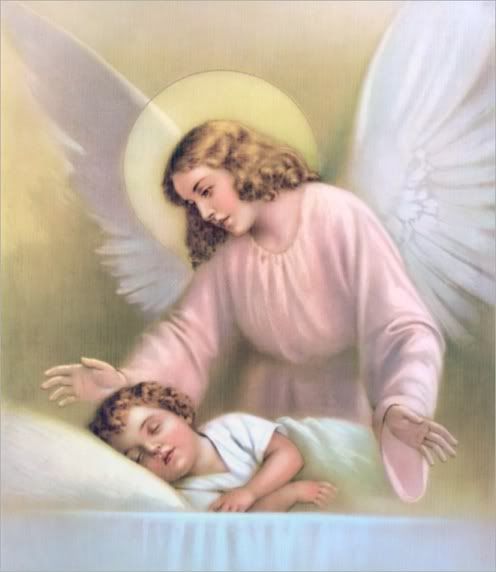
Labels: Angels
Friday, October 01, 2010
Friday At the Foot Of the Cross

Prayer by Saint Alphonsus de Liguori:
Oh, my God! “cast me not away from Thy face.” I know that Thou wilt never abandon me, unless I first abandon Thee. Experience of my own weakness makes me tremble lest I should again forsake Thee. Lord! it is from Thee I must receive the strength necessary to conquer hell, which labors to make me again its slave. This strength I ask of Thee for the sake of Jesus Christ. O my Saviour! establish between Thee and me a perpetual peace, which will never be broken for all eternity. For this purpose I ask Thy love. “He who loves not is dead.” O God of my soul, it is by Thee I must be saved from this unhappy death. I was lost; Thou knowest it. It is Thy goodness alone that has brought me into the state in which I am at present, in which I hope I am Thy friend. Ah, my Jesus! through the painful death which Thou didst suffer for my salvation, do not permit me ever more to lose Thee voluntarily. I love Thee above all things, I hope to see myself always bound with this holy love, and to die in the bonds of love, and to live for eternity in the chains of Thy love. O Mary! thou art called the mother of perseverance; through thee this great gift is dispensed. Through thy intercession I ask and hope to obtain it.
Labels: Friday At the Foot Of the Cross
October 2010

Important feasts observed during the month of October include
2nd Guardian Angels
3rd St. Theresa of Lisieux
4th St. Francis of Assisi
8th St. Bridget of Sweden
7th Our Lady of the Rosary (Lepanto)
9th St. Denis
11th Bl. Pope John XXIII
12th St. Wilfred of York
13th St. Edward the Confessor
15th St. Terese of Avila
16th St. Gall and St. Gerard Majella
17th St. Margaret Mary Alacoque
18th St. Luke the Evangelist
19th North American Martyrs
20th St. John Cantius
21st St. Gaspare de Bufalo and St. Ursula and Companions
22nd St. Mary Salome
23rd St. John of Capistrano
25th Forty Martyrs of England and Wales, and SS. Crispin and Crispinian
28th St. Jude and St. Simon
31st All Hallow's Eve (Halloween)
The month of October is dedicated by Holy Mother the Church to the Holy Rosary and Our Blessed Lady of the Rosary.
The entire month of October is within the Season After Pentecost, or "Ordinary Time". There are no embertides in October.
Popular novenas during the month of October include the Novena to Saint Jude.
Our Holy Father Pope Benedict XVI's published prayer intentions for the month of October, 2010 are:
General:
That Catholic Universities may more and more be places where, in the light of the Gospel, it is possible to experience the harmonious unity existing between faith and reason.
Missionary:
That the World Mission Day may afford an occasion for understanding that the task of proclaiming Christ is an absolutely necessary service to which the Church is called for the benefit of humanity.
Labels: First Of the Month Almanac
Thursday, September 30, 2010
Saint Jerome
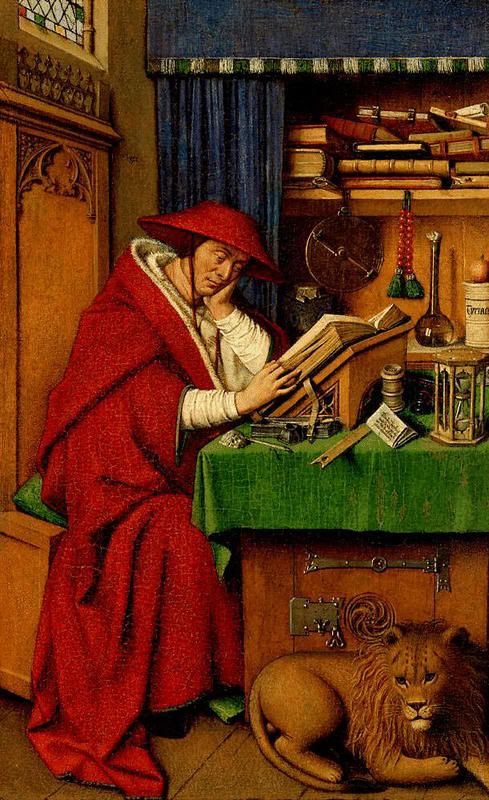
The Golden Legend
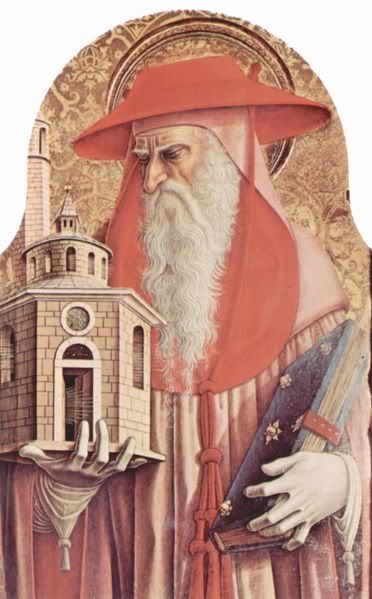
The Catholic Encylopedia
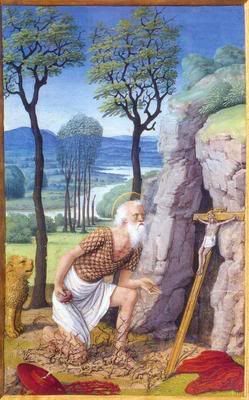
A familiar image to old readers, once a banner image here at Recta Ratio
Saint Jerome, please pray for us!
Labels: Our Saintly Brethern
Wednesday, September 29, 2010
Mid-Week Mix
Mac & O, How's She Cuttin?
The Corries, Ae Fond Kiss
Johnny McEvoy, The Homes Of Donegal
Richard Griffith, Myfanwy
Vanessa Mae, Greensleeves
Andy Stewart, A Scottish Soldier
The Dublin City Ramblers, The Isle Of Innisfree
Griffcats, Counting the Goats or Cyfri'r Geifr
The Corries, Ae Fond Kiss
Johnny McEvoy, The Homes Of Donegal
Richard Griffith, Myfanwy
Vanessa Mae, Greensleeves
Andy Stewart, A Scottish Soldier
The Dublin City Ramblers, The Isle Of Innisfree
Griffcats, Counting the Goats or Cyfri'r Geifr
Labels: Pleasing Tunes
Michaelmas 2010
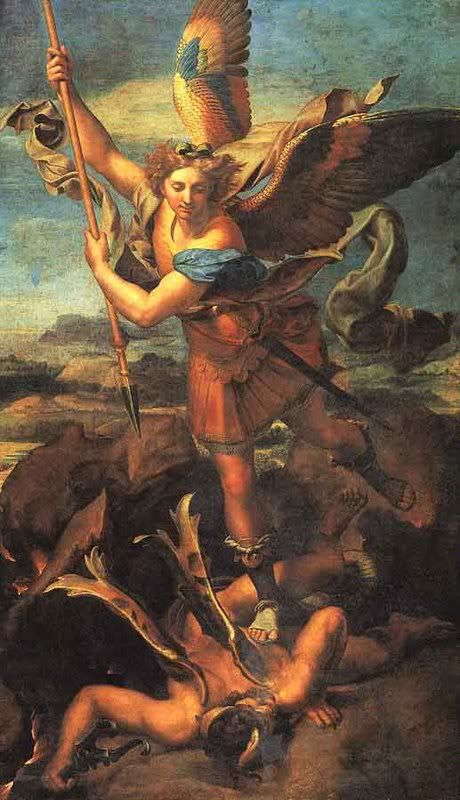
Today is Michaelmas, the Feast of Saint Michael and All Angels.
Saint Michael, perhaps the greatest of the Archangels, is the protector of the Church.
Michaelmas was a quarterly rent day in England and Ireland. It is the start of the university term at both Oxford and Cambridge. Presents and feasts featuring geese were very much the custom at this time of year.
Check here and here for Michaelmas customs.
Sancte Michael Archangele, defende nos in proelio, contra nequitiam et insidias diaboli esto praesidium. Imperet illi Deus, supplices deprecamur: tuque, Princeps militiae caelestis, Satanam aliosque spiritus malignos, qui ad perditionem animarum pervagantur in mundo, divina virtute, in infernum detrude.
Amen.
Saint Michael the Archangel,
Defend us in battle.
Be our protection against the
Wickedness and snares of the devil.
May God rebuke him,
We humbly pray.
And do thou,
O Prince of the Heavenly Host,
By the Divine Power,
Thrust into Hell
Satan and all the other evil spirits
which prowl about the world,
Seeking the ruin of souls.
Amen.
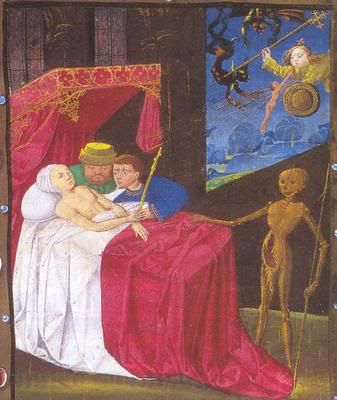
St. Michael protecting a newly deceased soul from the clutches of demons lurking by the deathbed.
Saint Michael also has another important duty. He is the principal usher of newly deceased souls to heaven. Medieval Books of Hours, as part of the Office of the Dead, often included a deathbed scene, where the soul of the just-departed leaves the body, and St. Michael has to fight off various demons who try to snatch the soul and carry it off to Hell. St. Michael is, therefore, one of the saints whose intercession is customarily invoked for a happy death, along with Our Blessed Lady, St. Joseph, and St. Peter.
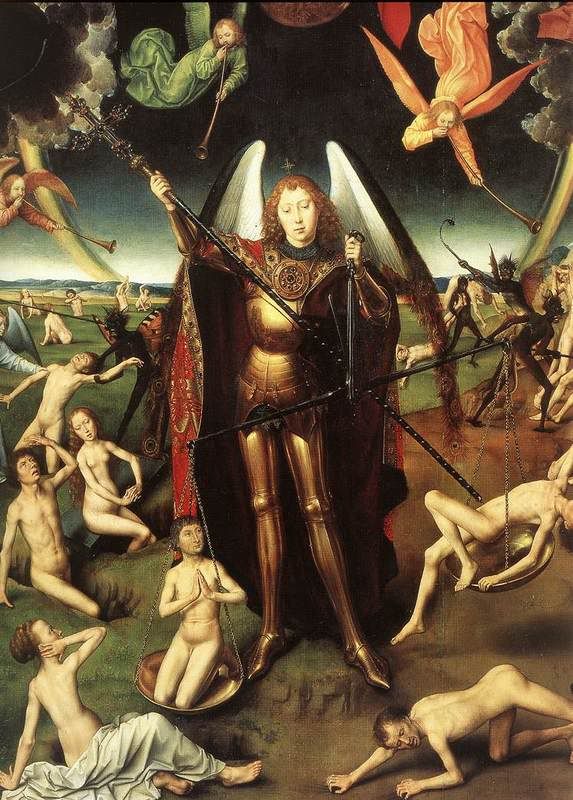
And of course, St. Michael is believed to be the one who will measure the worthiness of souls at the Last Judgment, as seen in this detail from Memling's Last Judgment triptych.
Here is a site with prayers to Saint Michael, including the variations of the basic prayer above.
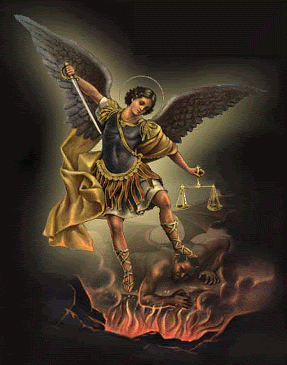
Labels: Our Saintly Brethern
Tuesday, September 28, 2010
Saint Wenceslaus
Monday, September 27, 2010
Saints Cosmas and Damien
Sunday, September 26, 2010
The Eighteenth Sunday After Pentecost
From The Liturgical Year, by Abbot Prosper Gueranger, OSB:
THE paralytic carrying his bed is the subject of this day's Gospel, and gives the eighteenth Sunday after Pentecost its title. This Sunday is inserted in the missal immediately after the Ember-days of autumn. We will not, like the liturgists of the Middle Ages, discuss the question of its having taken the place of the vacant Sunday, which formerly used always to follow the ordination of the sacred ministers, 2 in the manner we have elsewhere described, Manuscript sacramentaries and lectionaries of very ancient date give it the name, which was so much in use, of Dominica vacat. Whatever may be the conclusion arrived at, there is one interesting point for consideration, viz., that in the Mass of this day the order of the lessons taken from St. Paul is broken. The Letter to the Ephesians, which has furnished the Epistles since the sixth Sunday after Pentecost, is to-day interrupted, and in its stead we have some verses from the first Epistle to the Corinthians, wherein the apostle gives thanks to God for the manifold gratuitous gifts granted, in Christ Jesus, to the Church. Now, the powers conferred by the imposition of the bishop's hands on the ministers of the Church are the most marvellous gift that is known on earth, yea, in heaven itself. The other portions of the Mass, too, are, as we shall see further on, most appropriate to the prerogatives of the new priesthood. So that the liturgy of the present Sunday is particularly interesting when it immediately follows the Ember-days of September. But this coincidence is not of very frequent occurrence, at least as the liturgy now stands; nor can we dwell longer on these subjects without going too far into archæology, and exceeding our limits.
MASS
The Introits of the Sunday Masses since Pentecost have hitherto been taken from the Psalter. From Ps. xii. to Ps. cxviii, the Church, without ever changing the order of these sacred canticles, chose from each of them, as its own turn came, the verses most appropriate to the liturgy of each Sunday. But, dating from to-day, she is going to select her Introits elsewhere, with one exception, however, when she will again turn to this, the Book by excellence of divine praise. Her future opening anthems for the dominical liturgy to the end of the year will be taken from various other Books of the old Testament. For this eighteenth Sunday we have Jesus, son of Sirach, the inspired writer of Ecclesiasticus, asking God to ratify the fidelity of His prophets5 by the accomplishment of what they foretold. The present interpreters of the divine oracles are the pastors, whom the Church sends, in her own name, to preach the word of salvation and peace:let us, her children, pray with her that their words may never be void.
EPISTLE
The last coming of the Son of Man is no longer far off! The approach of that final event, which is to put the Church in full possession of her divine Spouse, redoubles her hopes; but the last judgment, which is also to pronounce the eternal perdition of so great a number of her children, mingles fear with her desire; and these two sentiments of hers will henceforth be continually brought forward in the holy liturgy.
It is evident that expectation has been, so to say, an essential characteristic of her existence. Separated from her Lord, she would have been sighing all day long in this vale of tears, had not the love which possesses her driven her to spend herself, unselfishly and unreservedly, for Him who is absolute Master of her whole heart. She, therefore, devotes herself to labour and suffering, to prayers and tears. But her devotedness, unlimited as it has been, has not made her hopes less ardent. A love without desires is not a virtue of the Church; she condemns it in her children as being an insult to the Spouse.
So just and, at the same time, so intense were, from the very first, these her aspirations that eternal Wisdom wished to spare His bride, by concealing from her the duration of her exile. The day and hour of His return is the one sole point upon which, when questioned by His apostles, Jesus refused to enlighten His Church. That secret constituted one of the designs of God's government of the world; but, besides that, it was also a proof of the compassion and affection of the Man-God; the trial would have been too cruel; and it was better to leave the Church under the impression, which after all was a true one, that the end was nigh in God's sight, with whom a thousand years are as one day. This explains how it is that the apostles, the interpreters of the Church's aspirations, are continually recurring to the subject of the near approach of our Lord's coming. St. Paul has just been telling us, and that twice over in the same breath, that the Christian is he who waiteth for the manifestation of our Lord Jesus Christ, and for the day of His coming. In his Epistle to the Hebrews, he applies to the second coming the inflamed desires of the ancient prophets for the first, and says: 'Yet a little, and a very little while, and He that is to come, will come, and will not delay.' The reason is that, under the new Covenant as under the old, the Man-God is called, on account of His final manifestation, which is always being looked for, He that is coming, He that is to come. The cry which is to close the world's history is to be the announcement of His arrival: 'Behold! the Bridegroom is coming.' And St. Peter, too, says: 'Having the loins of your mind girt up, think of the glory of that day whereon the Lord Jesus is to be revealed! Hope for it, with a perfect hope!' The prince of the apostles foresaw the contemptuous way in which future false teachers would scoff at this long-expected, but always put-off, coming: 'Where is His promise, or His coming? For, since the fathers slept, all things continue so, from the beginning of the creation!' Yes, he foresaw this, and forestalled their sarcasm, by answering it in the words which his brother Paul had previously used: 'The Lord delayeth not His promise, as some imagine; but dealeth patiently, for your sake, not willing that any should perish, but that all should return to penance. But the day of the Lord shall come as a thief, in which the heavens shall pass away with great violence; and the elements shall be melted with heat; and the earth, and the works which are in it, shall be burnt up. Seeing, then, that all these things are to be dissolved, what manner of people ought you to be in holy conversation and godliness, looking for, and hastening unto, the coming of the day of the Lord, by which the heavens, being on fire, shall be dissolved, and the elements shall melt with the burning heat of fire? But we look for new heavens and a new earth according to His promises, in which justice dwelleth. Wherefore, dearly beloved, seeing that you look for these things, be diligent that ye may be found undefiled and unspotted to Him in peace.... Wherefore, brethren, knowing these things before, take heed lest, being led aside by the error of the unwise, you fall from your own steadfastness.'
GOSPEL
In the thirteenth century, in many Churches of the west, the Gospel for to-day was that wherein our Lord speaks of the scribes and pharisees as seated on the chair of Moses. The Abbot Rupert, who gives us this detail in his book on the Divine Offices, shows how admirably this Gospel harmonized with the Offertory, which is the one we still have, and which alludes to Moses. 'This Sunday's Office,' says he, 'eloquently points out, to him who presides over the house of the Lord and has received charge of souls, the manner in which he should comport himself in the high rank, where the divine call has placed him. Let him not imitate those men, who unworthily sat on the chair of Moses; but let him follow the example of Moses himself, who, in the Offertory and its verses, presents the heads of the Church with such a model of perfection. Pastors of souls ought, on no account, to be ignorant of the reason why they are placed higher than other men: it is not so much that they may govern others, as that they may serve them.' Our Lord, speaking of the Jewish doctors, said: 'All whatsoever they shall say to you, observe and do; but according to their works, do ye not: for they say, and do not.' Contrariwise to these unworthy guardians of the Law, they that are seated on the chair of doctrine 'should teach, and act conformably to their teaching,' as the same Abbot Rupert adds. 'Or, rather,' says he, 'let them first do what it is their duty to do, that they may afterwards teach with authority; let them not seek after honours and titles, but make this their one object, to bear on themselves the sins of the people, and to merit to avert the wrath of God from those who are confided to their care. Such, we are told in the Offertory, is the example given them by Moses.'
The Gospel which speaks of the scribes and pharisees who were seated on the chair of Moses has now been appointed for the Tuesday of the second week of Lent. But the one which is at present given for this Sunday equally directs our thoughts to the consideration of the superhuman powers of the priesthood, which are the common boon of regenerated humanity. The faithful, whose attention used formerly, on this Sunday, to be fixed on the right of teaching which is confided to the pastors of the Church, are now invited to meditate upon the prerogative which these same men have of forgiving sins and healing souls. Even if their conduct be in opposition to their teaching, it in nowise interferes with the authority of the sacred chair, from which, for the Church and in her name, they dispense the bread of doctrine to her children. Moreover, whatever unworthiness may happen to be in the soul of a priest, it does not in the least lessen the power of the keys which have been put into his hands to open heaven and to shut hell. For it is the Son of Man, Jesus, who, by the priest, be he a saint, or be he a sinner, rids of their sins His brethren and His creatures, whose miseries He has taken upon Himself, and whose crimes He has atoned for by His Blood:
The miracle of the cure of the paralytic, which gave an occasion to Jesus of declaring His power of forgiving sins inasmuch as he was Son of Man, has always been especially dear to the Church. Besides the narration she gives us of it from St. Matthew in to-day's Gospel, she again, on the Ember Friday of Whitsuntide, relates it in the words of St. Luke. The Catacomb frescoes, which have been preserved to the present day, equally attest the predilection for this subject, wherewith she inspired the Christian artists of the first centuries. From the very beginning of Christianity, heretics had risen up denying that the Church had the power, which her divine Head gave her, of remitting sin. Such false teaching would irretrievably condemn to spiritual death an immense number of Christians, who, unhappily, had fallen after their Baptism, but who, according to Catholic dogma, might be restored to grace by the sacrament of Penance. With what energy, then, would our mother the Church defend the remedy which gives life to her children! She uttered her anathemas upon, and drove from her communion, those pharisees of the new law, who, like their Jewish predecessors, refused to acknowledge the infinite mercy and universality of the great mystery of the Redemption.
Like to her divine Master, who had worked under the eyes of the scribes, His contradictors, the Church, too, in proof of her consoling doctrine, had worked an undeniable and visible miracle in the presence of the false teachers; and yet she had failed to convince them of the reality of the miracle of sanctification and grace invisibly wrought by her words of remission and pardon. The outward cure of the paralytic was both the image and the proof of the cure of his soul, which previously bad been in a state of moral paralysis; but he himself represented another sufferer, viz., the human race, which for ages had been a victim to the palsy of sin. Our Lord had already left the earth, when the faith of the apostles achieved this, their first prodigy, of bringing to the Church the world grown old in its infirmity. Finding that the human race was docile to the teaching of the divine messengers, and was already an imitator of their faith, the Church spoke as a mother, and said: Be of good heart, son! thy sins are forgiven thee! At once, to the astonishment of the philosophers and sceptics, and to the confusion of hell, the world rose up from its long and deep humiliation; and, to prove how thoroughly his strength had been restored to him, he was seen carrying on his shoulders, by the labour of penance and the mastery over his passions, the bed of his old exhaustion and feebleness, on which pride, lust, and covetousness had so long held him. From that time forward, complying with the word of Jesus, which was also said to him by the Church, he has been going on towards his house, which is heaven, where eternal joy awaits him! And the angels, beholding such a spectacle of conversion and holiness, are in amazement, and sing glory to God, who gave such power to men.
THE paralytic carrying his bed is the subject of this day's Gospel, and gives the eighteenth Sunday after Pentecost its title. This Sunday is inserted in the missal immediately after the Ember-days of autumn. We will not, like the liturgists of the Middle Ages, discuss the question of its having taken the place of the vacant Sunday, which formerly used always to follow the ordination of the sacred ministers, 2 in the manner we have elsewhere described, Manuscript sacramentaries and lectionaries of very ancient date give it the name, which was so much in use, of Dominica vacat. Whatever may be the conclusion arrived at, there is one interesting point for consideration, viz., that in the Mass of this day the order of the lessons taken from St. Paul is broken. The Letter to the Ephesians, which has furnished the Epistles since the sixth Sunday after Pentecost, is to-day interrupted, and in its stead we have some verses from the first Epistle to the Corinthians, wherein the apostle gives thanks to God for the manifold gratuitous gifts granted, in Christ Jesus, to the Church. Now, the powers conferred by the imposition of the bishop's hands on the ministers of the Church are the most marvellous gift that is known on earth, yea, in heaven itself. The other portions of the Mass, too, are, as we shall see further on, most appropriate to the prerogatives of the new priesthood. So that the liturgy of the present Sunday is particularly interesting when it immediately follows the Ember-days of September. But this coincidence is not of very frequent occurrence, at least as the liturgy now stands; nor can we dwell longer on these subjects without going too far into archæology, and exceeding our limits.
MASS
The Introits of the Sunday Masses since Pentecost have hitherto been taken from the Psalter. From Ps. xii. to Ps. cxviii, the Church, without ever changing the order of these sacred canticles, chose from each of them, as its own turn came, the verses most appropriate to the liturgy of each Sunday. But, dating from to-day, she is going to select her Introits elsewhere, with one exception, however, when she will again turn to this, the Book by excellence of divine praise. Her future opening anthems for the dominical liturgy to the end of the year will be taken from various other Books of the old Testament. For this eighteenth Sunday we have Jesus, son of Sirach, the inspired writer of Ecclesiasticus, asking God to ratify the fidelity of His prophets5 by the accomplishment of what they foretold. The present interpreters of the divine oracles are the pastors, whom the Church sends, in her own name, to preach the word of salvation and peace:let us, her children, pray with her that their words may never be void.
EPISTLE
The last coming of the Son of Man is no longer far off! The approach of that final event, which is to put the Church in full possession of her divine Spouse, redoubles her hopes; but the last judgment, which is also to pronounce the eternal perdition of so great a number of her children, mingles fear with her desire; and these two sentiments of hers will henceforth be continually brought forward in the holy liturgy.
It is evident that expectation has been, so to say, an essential characteristic of her existence. Separated from her Lord, she would have been sighing all day long in this vale of tears, had not the love which possesses her driven her to spend herself, unselfishly and unreservedly, for Him who is absolute Master of her whole heart. She, therefore, devotes herself to labour and suffering, to prayers and tears. But her devotedness, unlimited as it has been, has not made her hopes less ardent. A love without desires is not a virtue of the Church; she condemns it in her children as being an insult to the Spouse.
So just and, at the same time, so intense were, from the very first, these her aspirations that eternal Wisdom wished to spare His bride, by concealing from her the duration of her exile. The day and hour of His return is the one sole point upon which, when questioned by His apostles, Jesus refused to enlighten His Church. That secret constituted one of the designs of God's government of the world; but, besides that, it was also a proof of the compassion and affection of the Man-God; the trial would have been too cruel; and it was better to leave the Church under the impression, which after all was a true one, that the end was nigh in God's sight, with whom a thousand years are as one day. This explains how it is that the apostles, the interpreters of the Church's aspirations, are continually recurring to the subject of the near approach of our Lord's coming. St. Paul has just been telling us, and that twice over in the same breath, that the Christian is he who waiteth for the manifestation of our Lord Jesus Christ, and for the day of His coming. In his Epistle to the Hebrews, he applies to the second coming the inflamed desires of the ancient prophets for the first, and says: 'Yet a little, and a very little while, and He that is to come, will come, and will not delay.' The reason is that, under the new Covenant as under the old, the Man-God is called, on account of His final manifestation, which is always being looked for, He that is coming, He that is to come. The cry which is to close the world's history is to be the announcement of His arrival: 'Behold! the Bridegroom is coming.' And St. Peter, too, says: 'Having the loins of your mind girt up, think of the glory of that day whereon the Lord Jesus is to be revealed! Hope for it, with a perfect hope!' The prince of the apostles foresaw the contemptuous way in which future false teachers would scoff at this long-expected, but always put-off, coming: 'Where is His promise, or His coming? For, since the fathers slept, all things continue so, from the beginning of the creation!' Yes, he foresaw this, and forestalled their sarcasm, by answering it in the words which his brother Paul had previously used: 'The Lord delayeth not His promise, as some imagine; but dealeth patiently, for your sake, not willing that any should perish, but that all should return to penance. But the day of the Lord shall come as a thief, in which the heavens shall pass away with great violence; and the elements shall be melted with heat; and the earth, and the works which are in it, shall be burnt up. Seeing, then, that all these things are to be dissolved, what manner of people ought you to be in holy conversation and godliness, looking for, and hastening unto, the coming of the day of the Lord, by which the heavens, being on fire, shall be dissolved, and the elements shall melt with the burning heat of fire? But we look for new heavens and a new earth according to His promises, in which justice dwelleth. Wherefore, dearly beloved, seeing that you look for these things, be diligent that ye may be found undefiled and unspotted to Him in peace.... Wherefore, brethren, knowing these things before, take heed lest, being led aside by the error of the unwise, you fall from your own steadfastness.'
GOSPEL
In the thirteenth century, in many Churches of the west, the Gospel for to-day was that wherein our Lord speaks of the scribes and pharisees as seated on the chair of Moses. The Abbot Rupert, who gives us this detail in his book on the Divine Offices, shows how admirably this Gospel harmonized with the Offertory, which is the one we still have, and which alludes to Moses. 'This Sunday's Office,' says he, 'eloquently points out, to him who presides over the house of the Lord and has received charge of souls, the manner in which he should comport himself in the high rank, where the divine call has placed him. Let him not imitate those men, who unworthily sat on the chair of Moses; but let him follow the example of Moses himself, who, in the Offertory and its verses, presents the heads of the Church with such a model of perfection. Pastors of souls ought, on no account, to be ignorant of the reason why they are placed higher than other men: it is not so much that they may govern others, as that they may serve them.' Our Lord, speaking of the Jewish doctors, said: 'All whatsoever they shall say to you, observe and do; but according to their works, do ye not: for they say, and do not.' Contrariwise to these unworthy guardians of the Law, they that are seated on the chair of doctrine 'should teach, and act conformably to their teaching,' as the same Abbot Rupert adds. 'Or, rather,' says he, 'let them first do what it is their duty to do, that they may afterwards teach with authority; let them not seek after honours and titles, but make this their one object, to bear on themselves the sins of the people, and to merit to avert the wrath of God from those who are confided to their care. Such, we are told in the Offertory, is the example given them by Moses.'
The Gospel which speaks of the scribes and pharisees who were seated on the chair of Moses has now been appointed for the Tuesday of the second week of Lent. But the one which is at present given for this Sunday equally directs our thoughts to the consideration of the superhuman powers of the priesthood, which are the common boon of regenerated humanity. The faithful, whose attention used formerly, on this Sunday, to be fixed on the right of teaching which is confided to the pastors of the Church, are now invited to meditate upon the prerogative which these same men have of forgiving sins and healing souls. Even if their conduct be in opposition to their teaching, it in nowise interferes with the authority of the sacred chair, from which, for the Church and in her name, they dispense the bread of doctrine to her children. Moreover, whatever unworthiness may happen to be in the soul of a priest, it does not in the least lessen the power of the keys which have been put into his hands to open heaven and to shut hell. For it is the Son of Man, Jesus, who, by the priest, be he a saint, or be he a sinner, rids of their sins His brethren and His creatures, whose miseries He has taken upon Himself, and whose crimes He has atoned for by His Blood:
The miracle of the cure of the paralytic, which gave an occasion to Jesus of declaring His power of forgiving sins inasmuch as he was Son of Man, has always been especially dear to the Church. Besides the narration she gives us of it from St. Matthew in to-day's Gospel, she again, on the Ember Friday of Whitsuntide, relates it in the words of St. Luke. The Catacomb frescoes, which have been preserved to the present day, equally attest the predilection for this subject, wherewith she inspired the Christian artists of the first centuries. From the very beginning of Christianity, heretics had risen up denying that the Church had the power, which her divine Head gave her, of remitting sin. Such false teaching would irretrievably condemn to spiritual death an immense number of Christians, who, unhappily, had fallen after their Baptism, but who, according to Catholic dogma, might be restored to grace by the sacrament of Penance. With what energy, then, would our mother the Church defend the remedy which gives life to her children! She uttered her anathemas upon, and drove from her communion, those pharisees of the new law, who, like their Jewish predecessors, refused to acknowledge the infinite mercy and universality of the great mystery of the Redemption.
Like to her divine Master, who had worked under the eyes of the scribes, His contradictors, the Church, too, in proof of her consoling doctrine, had worked an undeniable and visible miracle in the presence of the false teachers; and yet she had failed to convince them of the reality of the miracle of sanctification and grace invisibly wrought by her words of remission and pardon. The outward cure of the paralytic was both the image and the proof of the cure of his soul, which previously bad been in a state of moral paralysis; but he himself represented another sufferer, viz., the human race, which for ages had been a victim to the palsy of sin. Our Lord had already left the earth, when the faith of the apostles achieved this, their first prodigy, of bringing to the Church the world grown old in its infirmity. Finding that the human race was docile to the teaching of the divine messengers, and was already an imitator of their faith, the Church spoke as a mother, and said: Be of good heart, son! thy sins are forgiven thee! At once, to the astonishment of the philosophers and sceptics, and to the confusion of hell, the world rose up from its long and deep humiliation; and, to prove how thoroughly his strength had been restored to him, he was seen carrying on his shoulders, by the labour of penance and the mastery over his passions, the bed of his old exhaustion and feebleness, on which pride, lust, and covetousness had so long held him. From that time forward, complying with the word of Jesus, which was also said to him by the Church, he has been going on towards his house, which is heaven, where eternal joy awaits him! And the angels, beholding such a spectacle of conversion and holiness, are in amazement, and sing glory to God, who gave such power to men.
Labels: The Liturgical Year








































































































